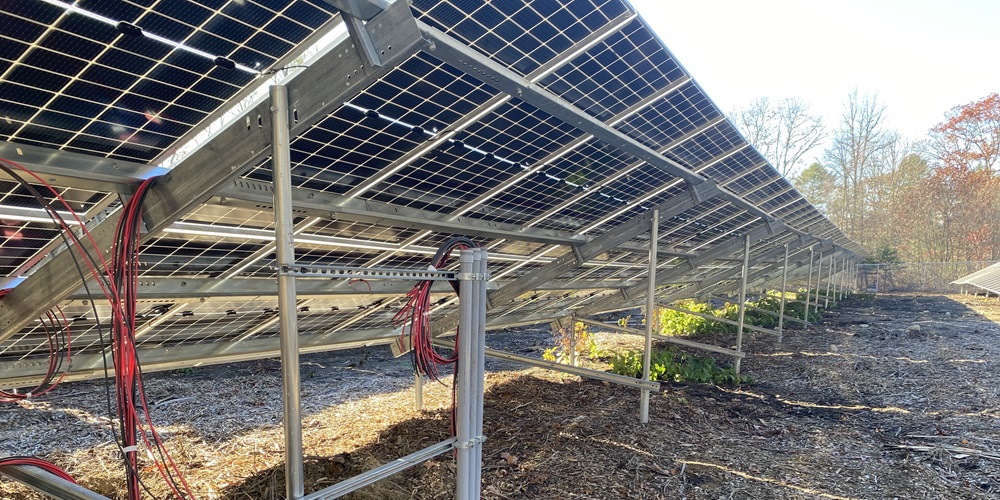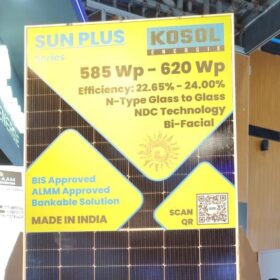From pv magazine USA
The Biden Administration has released a fact sheet detailing multiple solar panel related policies, including the removal of the bifacial solar panel exemption. This exemption previously allowed certain solar panels to bypass the Trump-era 15% tariff. The reinstatement of this tariff is expected to increase the cost of commercial, industrial, and utility-scale solar projects by 1% to 2%.
The administration also reiterated its focus on the solar sector, along with plans for continued expansion of its manufacturing base. This release follows yesterday’s announcement where the administration heightened the import tariffs on Chinese solar cells from 25% to 50%.

Meyer Burger’s first U.S.-manufactured solar panels: a bifacial model.In late 2022, the Biden administration imposed tariffs on solar modules from four Southeast Asian countries but delayed their implementation for two years to ensure business continuity. With this delay set to end next month, the White House announced that the “Department of Energy and the Department of Commerce will closely monitor import patterns to ensure the U.S. market does not become oversaturated” with stockpiled modules or products resulting from other unfair practices that might circumvent the ruling.
In response to today’s announcement, Danny O’Brien, President of Corporate Affairs at Qcells, expressed support: “Today’s announcement is yet another signal that President Biden is serious about ensuring the long-term success of solar manufacturing in the United States.”
However, the Solar Energy Manufacturers Association (SEMA) found the action lacking. “Lifting the exemption reinstates a 15% tariff, providing important, but sadly still insufficient, relief from anti-competitive trade practices until the tariff is set to expire in February 2026.”
SEMA is committed to collaborating with the administration to ensure the utilization of all solar panels from tariffed regions within the country by December 2024. Some estimate that over 100 GW of solar panels are currently stockpiled in the U.S., with projections of more than 45 GW by the end of 2023.
The fact sheet also indicated that the Treasury Department is set to release additional guidance on the domestic content requirements of the Inflation Reduction Act. It states, “Today’s Notice creates a new elective safe harbor that gives clean energy developers the option of relying on Department of Energy-provided default cost percentages to determine bonus eligibility.”
To support the domestic solar panel assembly industry, the cap on importing solar cells under Section 201 tariffs was raised from 5 GW to 7.5 GW. This measure aims to support the announced 125 GW of solar module assembly manufacturing capacity without stifling emerging solar cell production.
Bifacial solar panels, which are predominantly used in commercial, industrial, and utility-scale solar power projects, were previously exempt from tariffs. With the removal of this exemption, the cost of imported bifacial solar panels, typically ranging from $0.10-0.25 per watt, will increase by $0.015 to $0.0375 per watt. For commercial projects with installation costs between $1.50 and $2.75 per watt, these increases will result in system price hikes of about 1-2%. Bifacial panels now represent 98% of all solar panels imported into these sectors.
Due to significant reductions in solar panel prices, which have fallen from $30-40 per watt two years ago, the impact of these tariffs remains less severe today. However, the industry still faces financial uncertainties as the June 2022 tariff delay approaches its expiration, and new AD/CVD cases have been filed recently.
Author: JOHN FITZGERALD WEAVER
This content is protected by copyright and may not be reused. If you want to cooperate with us and would like to reuse some of our content, please contact: editors@pv-magazine.com.








By submitting this form you agree to pv magazine using your data for the purposes of publishing your comment.
Your personal data will only be disclosed or otherwise transmitted to third parties for the purposes of spam filtering or if this is necessary for technical maintenance of the website. Any other transfer to third parties will not take place unless this is justified on the basis of applicable data protection regulations or if pv magazine is legally obliged to do so.
You may revoke this consent at any time with effect for the future, in which case your personal data will be deleted immediately. Otherwise, your data will be deleted if pv magazine has processed your request or the purpose of data storage is fulfilled.
Further information on data privacy can be found in our Data Protection Policy.